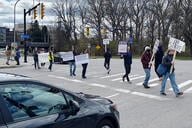You have /5 articles left.
Sign up for a free account or log in.
Despite an appeals court’s ruling Friday that President Barack Obama overstepped his constitutional authority in appointing three members to the National Labor Relations Board last year, the body will continue to decide on cases pending before it – including two with big implications for higher education.
The first case could lead to the reversal of a landmark 1980 decision by the U.S. Supreme Court, NLRB v. Yeshiva University, which bans tenure-track faculty members at private institutions from unionizing (in its decision, the court equated such faculty with managers due to their involvement in shared governance, rather than workers with collective bargaining rights). In May, NLRB issued a request for comments on an attempt by faculty members at Point Park University, a private institution in Pittsburgh, to be represented by the Communications Workers of America. The faculty union has been seeking recognition since 2003, but is largely at a standstill due to the Yeshiva decision.
The second case involves the right of graduate students to unionize at private universities. In June, the board announced it will reconsider one of its previous rulings that took away grad students' right to do so, in light of efforts to unionize graduate teaching assistants at New York University and graduate research assistants at the Polytechnic Institute of NYU. In both of those cases, regional NLRB officials ruled that the graduate students could not unionize because of the 2004 precedent (which found that teaching assistants at Brown University were primarily students, not employees with collective bargaining rights).
The NLRB is an independent federal agency that provides the legal framework for private-sector employees to organize or dissolve bargaining units in their workplace, and investigates unfair labor practice claims, among other duties. In addition to 40 administrative law judges, the agency consists of a board whose five members are typically appointed by the president and confirmed by the Senate.
In January 2012, during a 20-day Congressional recess, Obama appointed two Democrats – Sharon Block, former deputy labor secretary, and Richard E. Griffin, former general counsel to the International Union of Operating Engineers – and one Republican, Terence Flynn, counsel to an NLRB member, to the labor review board, despite warnings from Congressional Republicans not do so without seeking Senate confirmation. At the time of the appointments, the board was without a quorum of three members (Flynn has since resigned from the board, but it maintains the minimum three members needed to operate).
Obama said he was exercising his power to make "recess appointments," through which he can place people in jobs that normally require Senate confirmation when the Senate is not in session. But because the Senate staged brief, “pro forma” sessions-- a political tactic used that has historically been used by both parties to block such moves -- every few days during the recess, Republicans have questioned the legitimacy of Obama’s appointments, and the U.S. Court of Appeals for the District of Columbia Circuit unanimously concurred.
The president is widely expected to appeal the ruling to the U.S. Supreme Court.
NLRB continued to issue labor decisions following the ruling on Friday afternoon. In a separate statement, Mark Gaston Pearce, chairman, said the “board respectfully disagrees with today’s decision and believes that the president’s position in the matter will ultimately be upheld.” He noted that the decision applied only to one NLRB case.
A spokeswoman for the board said it would continue to decide on pending cases, including those relating to higher education.
Still, the ultimate implications of the appeals court’s ruling for all board decisions made since the recess appointments remain unclear. Ada Meloy, general counsel for the American Council on Education, said she believed that the NLRB could ask for a stay either from the appeals court or the Supreme Court, but that it was too early to tell what the ruling meant long-term.
“[T]here have not been a lot of judicial interpretations of the provisions of the Constitution related to recess appointments, so it will be interesting to see where this goes in the next stages,” said Meloy.
“It is possible that the decisions over the last year [made by the recess appointees] could be voided,” she added.
A lawyer for the American Federation of Teachers was unavailable for comment.





